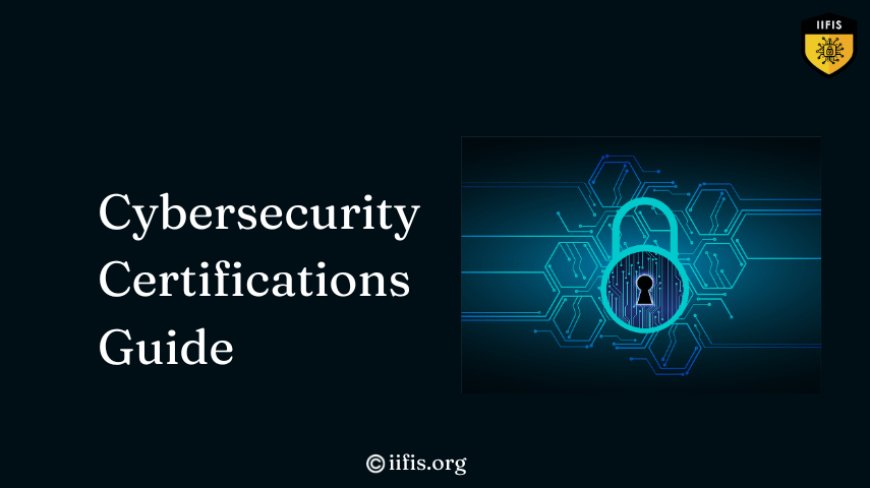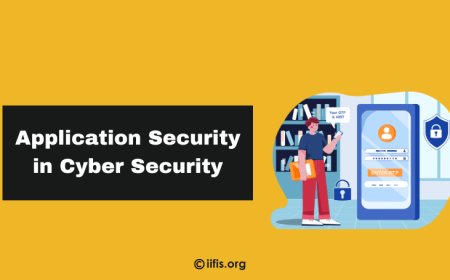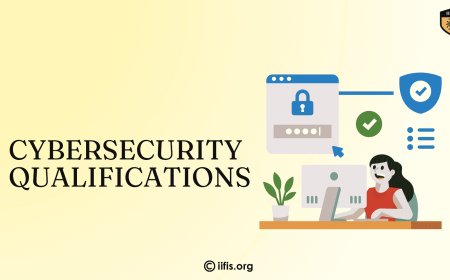We depend on technology more than ever—from smartphones and laptops to online banking and social media. As we use more digital devices and services, it’s important to protect our personal information and online accounts from cyber threats. That’s where cybersecurity comes in: it’s all about keeping computers, networks, and data safe from theft or damage. If you're thinking about working in cybersecurity, earning a certification is a great way to show you have the skills to protect systems and information. With so many certifications out there, though, it can be tough to know where to start. This guide will help you understand the different types of cybersecurity certifications and give you a clear path to begin your journey in this exciting field.
What Are Cybersecurity Certifications?
From my own experience in cybersecurity, I can tell you that certifications are a game changer. They’re not just pieces of paper — they’re official credentials that prove you have the skills and knowledge to protect systems, networks, and data from the growing number of cyber threats. I’ve earned certifications by completing specialized courses and passing exams that covered everything from network security to ethical hacking, and they’ve been essential in demonstrating my expertise.
These certifications have helped me gain credibility in the eyes of employers and made it clear that I have what it takes to safeguard digital systems. What’s great is that they’re valuable at every stage of your career, whether you're just starting out or already have experience. They also give you a competitive edge in the job market, especially as the demand for cybersecurity professionals continues to rise.
Why Should You Care About Cybersecurity Certifications?
From my experience, cybersecurity certifications are essential for credibility and career growth. They validate your skills and show employers that you're equipped to handle the latest security threats. With the industry constantly evolving, certifications help you stay updated on new tools and techniques. They also open doors to better job opportunities, promotions, and connections within the cybersecurity community. In a field that demands continuous learning, certifications are a great way to prove your expertise, stay relevant, and advance your career.
Types of Cybersecurity Certifications
There are many cybersecurity certifications available. They vary in difficulty, topics covered, and the level of experience needed. Here are some of the most common types:
1. Entry-Level Certifications
If you're just starting out in cybersecurity, entry-level certifications are a good place to begin. These certifications will help you understand the basics of network security, data protection, and how to deal with common cyber threats.
-
CompTIA Security+: This is one of the most popular entry-level certifications. It covers topics like network security, encryption, and how to respond to security incidents. It’s a great certification for beginners and helps open the door to many cybersecurity jobs.
-
Cisco CCNA Security: If you're interested in network security, this certification from Cisco focuses on securing Cisco networks. It's an excellent choice for those who want to work with routers, switches, and network devices.
2. Intermediate Certifications
As you gain more experience, you may want to pursue more specialized certifications. These are for individuals who already have some experience and want to dive deeper into areas like ethical hacking or managing security programs.
-
Certified Ethical Hacker (CEH): The CEH certification is for those who want to understand how hackers think and work. It teaches you the techniques used by cybercriminals so you can protect against them. This certification is great if you're interested in penetration testing or ethical hacking.
-
Certified Information Systems Security Professional (CISSP): This is a more advanced certification for experienced professionals. It covers a wide range of topics, from managing security programs to risk management. CISSP is highly respected in the industry and is often required for leadership roles in cybersecurity.
3. Advanced Certifications
For those with several years of experience, advanced certifications allow professionals to specialize even further. These certifications typically require more knowledge and experience in specific areas.
-
Certified Cloud Security Professional (CCSP): As more companies move their data to the cloud, the need for cloud security grows. The CCSP certification focuses on securing cloud environments and services, and it’s ideal for those who want to specialize in cloud security.
-
Certified Information Security Manager (CISM): This certification is for professionals who want to manage security programs in an organization. It’s focused on risk management, governance, and how to build and manage an organization’s security policy.
Why Should You Pursue a Cybersecurity Certification?
Now that you understand the different types of certifications
1. Better Job Opportunities
One of the biggest advantages of earning a cybersecurity certification is that it can make you more competitive in the job market. Employers are often looking for candidates with specialized skills and certifications that show they have the knowledge needed to keep systems and data secure.
2. Higher Salaries
Cybersecurity professionals are in high demand, and many certifications can lead to higher-paying jobs. For example, those with certifications like CISSP or CEH often earn higher salaries than their non-certified counterparts. The higher your level of expertise, the more you can potentially earn.
3. Career Advancement
As you gain experience and earn more certifications, you increase your chances of moving up in your career. Many cybersecurity roles require certifications for advancement, and having the right certifications can lead to leadership positions or more specialized roles in the field.
How to Choose the Right Certification
With so many options available, it can be difficult to decide which certification is right for you. Here are a few things to consider:
1. Know Your Career Goals
What area of cybersecurity interests you? Do you want to focus on network security, ethical hacking, or cloud security? Understanding your career goals can help you choose the right certification to pursue.
2. Consider Your Current Knowledge
If you're just starting, entry-level certifications like CompTIA Security+ or CCNA Security are great choices. But if you already have experience in the field, you might want to look into more advanced certifications like CISSP or CEH.
3. Research Industry Demand
Some certifications are more valuable depending on the industry or region you’re in. Research the types of certifications that employers in your area or desired field are looking for. For example, if you’re interested in working in a cloud-focused role, the CCSP certification might be particularly useful.
How to Prepare for Certification Exams
Preparing for certification exams can take time and effort, but the rewards are worth it. Here are a few tips to help you succeed:
1. Use Study Resources
There are many study materials available, including books, online courses, and practice exams. Use a variety of resources to ensure you understand the material and can apply it in real-world situations.
2. Join Study Groups
Studying with others can be very helpful. Joining a study group or online forum allows you to discuss difficult topics and share study tips.
3. Get Hands-On Experience
Cybersecurity is a field that requires practical skills. Set up a home lab to practice what you’ve learned or take part in online challenges like Capture the Flag (CTF) events, which test your ability to find and fix security vulnerabilities.
Costs and Time Commitment
Earning certifications often requires both time and money. The cost of exams can vary depending on the certification, with some entry-level exams costing a few hundred dollars, while more advanced certifications can cost several thousand dollars. It's important to plan your budget and set aside time to study. Depending on the certification, you might need a few months of preparation to feel ready for the exam.
Maintaining Your Certifications
Once you’ve earned a certification, it’s important to keep it current. Many certifications require you to earn Continuing Professional Education (CPE) credits to maintain your status. This often involves attending courses, webinars, or completing other educational activities.
Myths and Facts about Cyber Security
|
Cybersecurity is only for large companies. |
Everyone is a potential target. Small businesses and individuals are also at risk. |
|
Antivirus software is enough. |
Cyber threats are constantly evolving. Full protection requires multiple layers, not just antivirus. New attack methods emerge regularly, requiring constant vigilance. |
|
Cybersecurity is only about hackers. |
It also involves data privacy, network security, and system integrity. Strong passwords are key. Unique, complex passwords and multi-factor authentication (MFA) are crucial. |
|
Only big organizations are targeted. |
Hackers target anyone with vulnerabilities, including individuals. Cybersecurity is proactive. It’s about prevention, not just reacting to attacks. |
Cybersecurity Certification Requirements:
-
Experience: Some certifications, like CISSP, require a few years of professional experience in cybersecurity or related fields, while others, such as CompTIA Security+, are beginner-friendly and have no prerequisites.
-
Training: While not always mandatory, completing official training courses (online or in person) can be highly beneficial in preparing for exams.
-
Exams: Most certifications require passing an exam that tests your knowledge on key topics like network security, ethical hacking, data protection, and encryption.
Popular Certifications & Requirements:
-
CompTIA Security+: No prior experience is required, though basic IT knowledge helps. Covers fundamental cybersecurity topics, ideal for beginners.
-
CISSP (Certified Information Systems Security Professional): Requires 5 years of work experience in cybersecurity. Focuses on enterprise security, risk management, and governance.
-
CEH (Certified Ethical Hacker): Requires 2 years of experience in cybersecurity or completion of an official EC-Council training program. Focuses on ethical hacking and penetration testing techniques.
-
CCSP (Certified Cloud Security Professional): Requires 5 years of IT experience, with 3 years in cloud security. The exam focuses on securing cloud environments and data protection.
-
CompTIA Cybersecurity Analyst (CySA+): Requires foundational knowledge in networking and security (e.g., through Security+). Focuses on threat detection, vulnerability management, and incident response.
Common Interview Questions:
-
Basic Knowledge:
-
What is the CIA triad, and why is it important in cybersecurity?
-
Can you explain the difference between symmetric and asymmetric encryption?
-
What is a firewall, and how does it protect networks?
-
Incident Response & Threat Detection:
-
How would you respond to a potential data breach or security incident?
-
Describe how you would detect and mitigate a phishing attack.
-
Tools & Technologies:
-
Which cybersecurity tools are you familiar with (e.g., firewalls, SIEMs, IDS/IPS)?
-
Have you worked with penetration testing tools like Kali Linux or Metasploit? Describe how you used them.
-
Advanced Topics:
-
What are advanced persistent threats (APTs), and how would you defend against them?
-
How would you secure a cloud-based environment?
Preparation Plan:
-
Assess Your Skill Level: Take a look at your current knowledge of IT and security. If you're new to the field, start with entry-level certifications like CompTIA Security+.
-
Choose the Right Certification: Pick a certification based on your experience and career goals. Beginners can opt for Security+ or CEH, while more experienced professionals can aim for advanced certifications like CISSP or CCSP.
-
Study Resources:
-
Books: Use certification-specific study guides (e.g., "CompTIA Security+ Study Guide" or "CISSP All-in-One Exam Guide").
-
Online Courses: Enroll in courses on platforms like SKillfloor and LinkedIn Learning.
-
Practice Exams: Regularly take practice exams to test your knowledge and identify areas to improve.
-
Hands-On Practice: Set up a home lab to practice security configurations, ethical hacking, and incident response. Use platforms like TryHackMe, Hack The Box, or OverTheWire for real-world challenges.
-
Join Online Communities: Participate in forums like Reddit’s r/cryptsecurity, Spiceworks, or LinkedIn groups to discuss cybersecurity trends, ask questions, and get advice.
-
Create a Study Schedule: Plan your study time to spread across several months (typically 3-6 months). Dedicate time for reading, practice tests, and hands-on exercises.
-
Exam Day Prep: In the last few weeks, review key concepts, focus on weak areas, and take full-length practice exams. Make sure to get enough rest the night before the exam.
Post-Certification:
-
Stay updated: this is a constantly evolving field. Stay current by taking advanced courses, attending webinars, and reading up on the latest threats and tools.
-
Gain hands-on experience: Look for internships or junior cybersecurity roles to apply your knowledge in real-world environments.
-
Networking: Attend cybersecurity conferences like DEF CON, Black Hat, or RSA Conference to meet industry professionals, learn about emerging trends, and expand your network.
-
Continuous Learning: Many certifications, like CISSP, require ongoing education (CPEs) to maintain your certification, so make learning a regular part of your career growth.
Cybersecurity certifications are essential for career growth, offering credibility, competitive advantages, and specialized skills. Whether you're starting with entry-level certifications like CompTIA Security+ or advancing to certifications like CISSP, they demonstrate your expertise and help you stay updated in an ever-evolving field. By choosing the right certification and preparing thoroughly, you can enhance job prospects, increase earning potential, and ensure continuous professional development in cybersecurity.

































